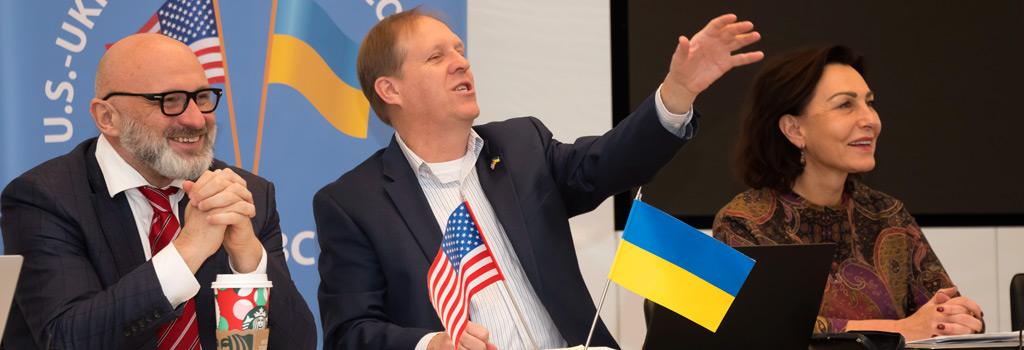Featured Galleries USUBC COLLECTION OF OVER 160 UKRAINE HISTORIC NEWS PHOTOGRAPHS 1918-1997
 Holodomor Posters
Holodomor Posters

STATEMENT BY U.S.-UKRAINE BUSINESS COUNCIL (USUBC)
Regarding the new IMF Extended Fund Facility for Ukraine
.jpg) U.S.-Ukraine Business Council (USUBC),
U.S.-Ukraine Business Council (USUBC),
Wash, D.C., Sat, Mar 28, 2020
WASHINGTON. D.C. -- Ukraine has over the past several years taken a considerable number of concrete steps to boost private sector investor and business confidence. Ukraine has worked to demonstrate to the world and to its domestic and international investor community that the county is a reliable and stable partner. The banking and monetary system of Ukraine has stabilized and has been experiencing growth. There has been a strengthening of the hryvnia and the ability for private companies to borrow money at declining rates of interest.
Ukraine's leadership, President Zelenskyy, his administration, the Prime Minister, Cabinet of Ministers and Verkhovna Rada of Ukraine needs to continue the path of stability and major reforms even in the face of the COVID-19 challenge. Ukrainians have demonstrated on numerous occasions that they want to live in a country that is independent, democratic, prosperous, integrated into Europe, under the rule of law, with a strong private economic and business sector and a vibrant and effective civil society.
The government of Ukraine must move quickly and decisively to reach a new agreement with the International Monetary Fund (IMF) (Extended Fund Facility, EFF), to strengthen its economic position during this unprecedented crisis and allow Ukraine to continue to accept total responsibility for all of its sovereign debt.
Any actions otherwise would produce a staggering sequence of negative, long-term, consequences for investors, for business confidence, the expansion of job opportunities, support from the international community, would set back Ukraine for years to come, and would destroy the dreams and hopes of the people of Ukraine. Any and all discussion of default should not be considered under any circumstances.
The U.S.-Ukraine Business Council (USUBC), www.USUBC.org, was pleased to read the statement last Thursday by the Managing Director of the International Monetary Fund (IMF) Ms.. Kristalina Georgieva, “This last week, very good progress has been made in the discussions with the Ukrainian authorities on the new Extended Fund Facility (EFF) arrangement. Adoption of legislation to improve the bank resolution framework and on land reform would allow moving forward quickly with finalizing the parameters of the new arrangement, with larger access than previously envisaged.”
The U.S.-Ukraine Business Council (USUBC) also supports the following statement made las Friday by eight major business associations in Ukraine who represent the largest employers in the country, who pay the majority of taxes to the state budget and who unite in petitioning every Verkhovna Rada member to pass the necessary laws in the near future so that the country can receive IMF funding.
STATEMENT BY EIGHT BUSINESS ASSOCIATIONS IN UKRAINE ---- Kyiv, Ukraine, Friday, March 27, 2020
Dear members of the Verkhovna Rada of Ukraine!
The devastating impact of COVID-19 acute respiratory disease caused by SARS-CoV-2 coronavirus is unprecedented in the world.
There are nearly 550,000 confirmed cases of infection as of today, with more than 24,000 deaths in 199 countries and territories worldwide.
The authorities in different countries are taking swift steps to try to prevent collapse of their economies, bankruptcy of companies, the loss of tens of millions of jobs, and the destruction of their citizens’ savings and livelihoods. Just yesterday, March 26, the leaders of the G20 countries issued a joint statement announcing their readiness to invest over $5 trillion into the global economy to address the negative effects of the pandemic.
Most economists agree that the world has already entered a period of recession, they are not sure how long it will last and how profound the consequences for the economy will be. The economic downturn from the pandemic is likely to be one of the most significant tragedies within several generations.
According to various estimates, the global economy collapse will be as dramatic as during the 2009 global financial crisis, and possibly even more dramatic, depending on how quickly the increase in quantity of infection is alleviated and how painful the quarantine measures are which the countries will have to implement.
The threat of coronavirus to emerging markets such as Ukraine is even more severe, both in the healthcare and economic sense. International capital markets have closed for this group of countries, and the Institute of International Finance reports that as of January 21, $80 billion has been withdrawn from the developing countries.
Although Ukraine has entered the crisis caused by the virus with foreign currency reserves worth $27 billion, the effects of the crisis on Ukraine are already having a serious economic effect that will only intensify in the coming days and months. The budgetary situation is critical. Within the first two months of this year the budget revenue deficit has reached UAH 17 billion, and if this trend continues the budget deficit for 2020 will be twice the estimated UAH 96 billion.
Additionally, the quarantine measures in Ukraine and the global economic crisis have already hit business hard and will result in a sharp decline in production and taxes. Given the expected 20-50% drop in sales, as shown by the latest Business Impact Survey, the budget will receive significantly lower tax revenues in 2020, while social payments will continue to increase. Combating the spread of COVID-19 requires at least over UAH 200 billion, although this number may be much higher.
Moreover, the government faces the issue of servicing external and internal debts. If the repayment of domestic debt can be refinanced, the repayment of external debt in the amount of $3.5 billion by the end of the year and doubling or even tripling of the budget deficit to $7-10 billion means that Ukraine needs $10-13 billion additional financing (400-500 billion UAH).
Leading experts predict that if the quarantine is extended for several months and the International Monetary Fund (IMF) program is in place, Ukraine's GDP will fall by 9% in 2020, and the hryvnia exchange rate may reach 35 UAH / US$1.
However, without the IMF program the preliminary forecast is even more dire - a double-digit economic downturn, rapid devastation of gold and currency reserves, high inflation and a significant rise in unemployment. Without the support of the IMF and other international organizations Ukraine can only deal with budgetary gaps by either a sharp tax increase, or by reduction in budget expenditures, or by resorting to printing money, probably in combination with a foreign debt default.
In any case, the cost of such an approach would be the collapse of the economy, impoverishment of the population and mass unemployment. A tax rate increase or a reduction in budget expenditures in the face of the current crisis will lead to an even greater suppression of domestic demand.
Sequestration of the budget / increase in tax pressure will further the economic decline by at least 15% yoy and cause a wave of bankruptcies. This will result in permanent (not temporary) job losses for some 500,000 people and increase unemployment to a record 12% in Ukraine’s history. At the same time, the mass printing of money and default will destabilize the already strained situation on the foreign exchange market.
The NBU reserves have already been reduced to $24 billion, and it’s unlikely that they will be sufficient to keep the exchange rate under control, since the emission pressure on the currency equivalent to $7-10 billion to finance the budget deficit will be accompanied by an outflow of capital, which in previous crises amounted to $11-13 billion per year.
Hryvnia devaluation can reach 45-65% of the current level, up to 50-80 UAH / US$, and in order to stabilize the exchange rate tight currency restrictions will have to be imposed which will exacerbate the crisis. Depreciation of the Hryvnia will lead to a 20-50%increase in inflation and a minimum 30% decline in real incomes of the population.
This will again result in a profound economic downturn and a rise in unemployment, with no prospect of rapid recovery due to lack of access to capital markets for the state and the private sector after the default.
Given that the situation is continuing to unfold, the funds from the IMF and Ukraine’s other international partners remain the only source of funding in the near future. Any calls for Ukraine to declare default should be ignored, since the long-term effect of such a decision is very dangerous.
The country needs capital and financial assistance from the global community to protect its citizens from COVID-19 and to help mitigate the economic impact of this global pandemic. The worst that can happen is to lose any access to funding, making the COVID-19 crisis worse than it already is. By declaring a default, Ukraine will become a pariah in the global market, and it will most likely take decades before the country recovers. Any talk of default should end immediately, and a clear message should be sent to the global community: Ukraine is a functioning part of the global economy and it makes responsible decisions to protect its future.
Any politician who approves of a default will certainly be responsible for its consequences, for the hundreds of thousands of jobs and lives of people which will be destroyed by this default.
At the same time, we welcome Ukraine’s formal request for review, in line with a joint call by the World Bank and the IMF to the G-20 countries unveiled on March 26. In particular, the World Bank Group and the IMF urged the governments of all creditor states to suspend debt collection from the world’s poorest countries under bilateral credit agreements, and called on the G20 countries to identify a list of countries with unfavorable debt situations and to submit proposals for debt relief for them.
Our eight business associations represent the largest employers in the country, who pay the majority of taxes to the state budget and unite in petitioning every Verkhovna Rada member to pass the necessary laws in the near future so that the country can receive IMF funding.
We understand how difficult it is to hold the Verkhovna Rada sessions during quarantine, when several members of Parliament have been positively tested for coronavirus. At the same time, major businesses across the country, employing millions of people, continue to work daily to get foodstuffs on store shelves, to provide quarantined households with the necessary supplies, to ensure that masks and protective equipment is produced at the factories, etc.
We urge the Verkhovna Rada of Ukraine members to act decisively and to urgently pass the laws required for obtaining funds from the International Monetary Fund under the Extended Financing Program (EFF), as well as to obtain crisis funds aimed at supporting Ukraine in its fight against the coronavirus.
On behalf of:
Federation of Employers of Ukraine (FEU)
Unions of Ukrainian Entrepreneurs (UUE)
American Chamber of Commerce (AMCHAM)
European Business Association (EBA)
BUSINESS100
Ukrainian Agrarian Business Club (UCAB)
IT Ukraine Association
CEO Club
------------------------------------------------------
NOTE: The English translation above was done by a private translator. It is not an official one by the eight business associations.

















